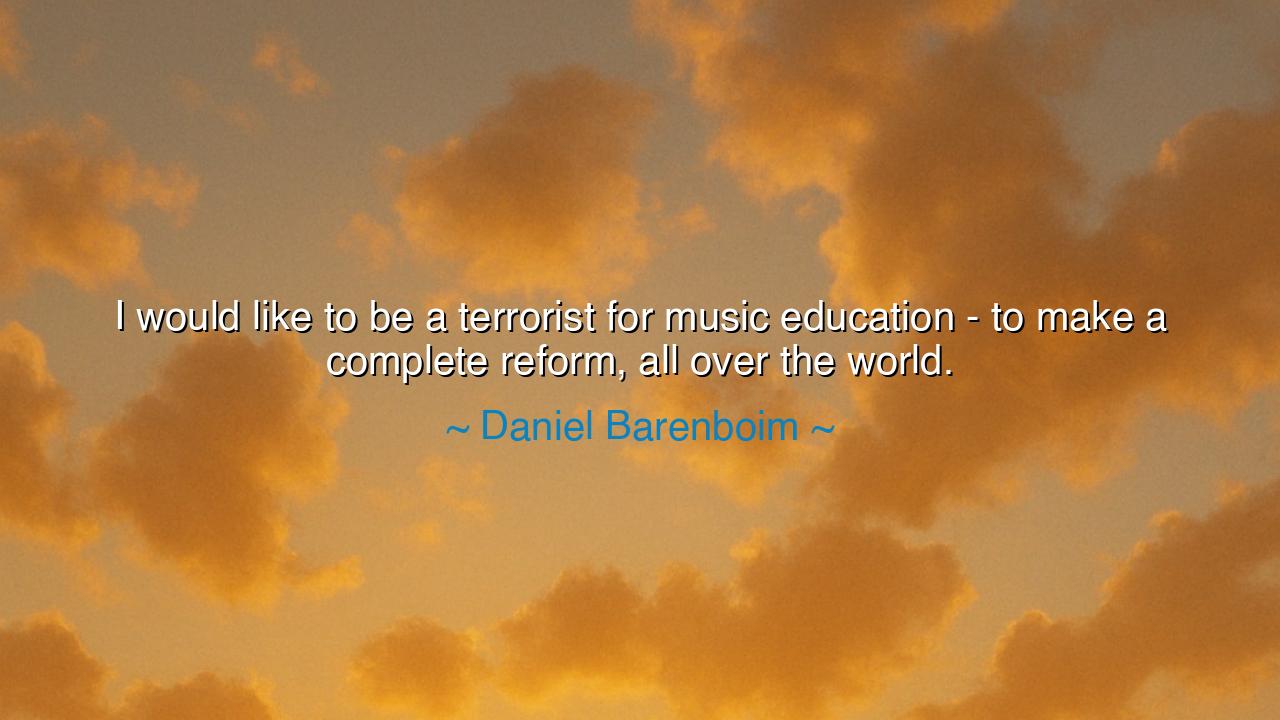
I would like to be a terrorist for music education - to make a
I would like to be a terrorist for music education - to make a complete reform, all over the world.






Hear the daring words of Daniel Barenboim, the great conductor and visionary: “I would like to be a terrorist for music education—to make a complete reform, all over the world.” These words, shocking in their force, are not a call to violence but a call to urgency, a cry from the soul of one who knows that art, if it is to survive, must not be left as an ornament for the privileged, but must be reborn as a living necessity for all peoples. His choice of the word terrorist is deliberate—provocative, unsettling—meant to awaken us from complacency, to stir us into action for a cause too long neglected.
To understand his meaning, we must see music education not as luxury but as lifeblood. Music is not mere entertainment; it is language older than words, a universal tongue of the spirit. When education in music is withheld, humanity is robbed of one of its deepest tools of expression, empathy, and unity. Barenboim, who has long sought harmony between nations through orchestras that unite enemies, knows that reform in music education is not about notes and scales, but about cultivating humanity itself. His cry is for a revolution of the spirit.
The call for reform “all over the world” is nothing less than a global vision. Barenboim sees that in many lands, music is the privilege of the wealthy, taught only to the few, while the many remain in silence. Yet music belongs to all. It is the drum of the tribes, the chant of the monks, the song of the oppressed, the lullaby of mothers across centuries. To reform music education everywhere is to break down barriers, to ensure that every child, regardless of nation or class, may know the discipline, the freedom, the beauty, and the unity that music brings.
History itself offers us examples of such transformative power. Consider Zoltán Kodály of Hungary, who reformed his nation’s education by making singing central to every child’s life. Through music education, he gave children not only skill but identity, pride, and connection. Or recall José Antonio Abreu of Venezuela, who founded El Sistema, an orchestral movement that lifted hundreds of thousands of poor children out of despair, giving them dignity and hope through violin and trumpet. These are living echoes of Barenboim’s vision, proof that radical reform in music education can change the destiny of entire generations.
The meaning of Barenboim’s quote is therefore both radical and holy: he seeks not minor adjustments, but a sweeping transformation. To be a terrorist for music education is to be relentless, uncompromising, and fearless in demanding that music be restored to its rightful place in human life. It is to disturb comfort, to challenge systems, to shake the gates of institutions until they release this treasure to all. It is the recognition that music is not optional, but essential.
The lesson for us is this: do not treat music education as a luxury or an afterthought. Wherever you are, honor it, defend it, and spread it. Teach your children songs, support schools that bring instruments to the poor, fight for policies that make music part of every child’s learning. For music is not only about producing artists—it is about producing whole human beings, capable of feeling, imagining, and connecting beyond words.
And what practical steps can we take? Share music freely—sing in families, play in communities, create choirs, ensembles, and bands that welcome all. Support organizations that bring instruments to disadvantaged children. Advocate for reform in your schools and cities. And most importantly, never cease to see music as a language of peace, a force that can heal wounds and bridge divides.
Thus let Barenboim’s bold cry echo across the generations: “I would like to be a terrorist for music education—to make a complete reform, all over the world.” Let us not shrink from its provocation, but take it as a summons to urgency. For when music is given to all, the world will not only be more educated—it will be more human.






AAdministratorAdministrator
Welcome, honored guests. Please leave a comment, we will respond soon